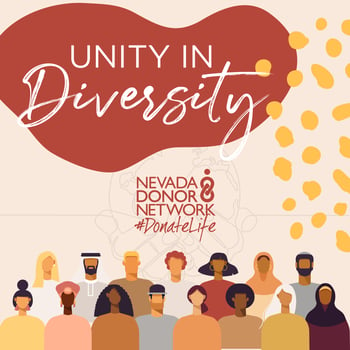We are celebrating the one-year anniversary of Nevada Donor Network’s Diversity Council! The leaders who compose this team are incredibly experienced and have diverse backgrounds that have focused on developing strategies to reach multicultural communities in Nevada. Their goal is to translate this knowledge into bringing awareness to organ, eye and tissue donation. The targeted communities include African American, Asian/Pacific Islander, Hispanic, LGBTQ+ and Native American individuals.
A part of this volunteer leadership role is to embody Nevada Donor Network’s culture in our community. Along with being an advocate for our lifesaving and healing mission in their everyday life. What inspires the team is driving meaningful and lasting change in not only themselves, but also those they interact with daily.
A celebration and culmination of this work starts August 1st and ends at the end of the month! National Multicultural Donor Awareness Month (NMDAM) is a collaborative initiative of the National Organ, Eye and Tissue Donation Multicultural Action Group. It was created to improve and save the quality of life of diverse communities. This means we all work towards developing a positive donation culture which leads to even more lives saved and healed by donation. It begun as National Minority Donor Awareness Week that was founded in 1996 by National Minority Organ Tissue Transplant Education Program (MOTTEP) with the goal of bringing heightened awareness to donation and transplantation in multicultural communities.
Did you know? According to the Organ Procurement and Transplantation Network (OPTN), more than 60% of the over 100,000 Americans waiting on the national organ transplant waiting list are from a multicultural background. Specifically, African Americans make up more than 30,000 patients, followed by Latinos/Hispanics making up over 22,000 patients, Asian American and Pacific Islanders make up almost 10,000 patients and Native Americans make up nearly 900 patients. Health conditions like diabetes and high blood pressure can lead to the need for an organ transplant, which contributes to the higher number of minorities on the waiting list.
According to the United Network of Organ Sharing (UNOS), the success of an organ transplant is not impacted by the race or ethnicity of the donor and recipient. However, a closer genetic match between the two can increase the chance of longer-term survival. It is important to understand the shortages of suitable donated organs and for people of all backgrounds to consider registering as organ, eye, and tissue donors. At Nevada Donor Network, we will continue to empower our community leaders, team members and more to speak to all Nevadans while meeting them where they are to better understand our mission.
How are you sharing our mission with your community? Register to be a hero and inspire them here!

